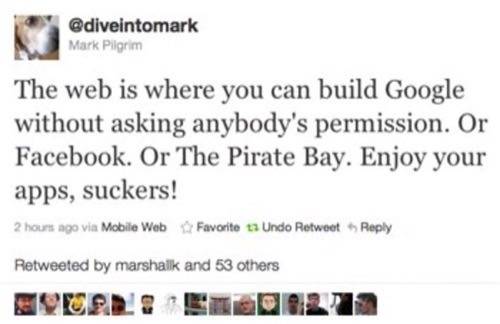Joe Hewitt, one of the most important software developers in recent history, published a provocative and sad post on his personal blog today, predicting that unless the open and free Web gets someone to own and take responsibility for advancing it, it will inevitably fall into virtual obscurity in the dust of fast evolving platforms like iOS, Android and Windows. Chris White, one of the co-founders of Android, offers a compelling argument against Hewitt’s perspective, though.

As one of the primary co-creators of Firefox, Hewitt single-handedly built the Facebook iPhone app. and when he left Facebook fed up with Apple’s approval process for apps, he announced that his next aim was to build tools for mobile HTML5 developers. Apparently that work has led to some frustrating experiences trying to support the open web. It’s not surprising, but it is pretty heartbreaking. It’s hard to imagine a decentralized platform like the web evolving to make as many things possible, as quickly and at scale, as the big centralized app platforms.
“The Web has no one who can ensure that the platform acquires cutting edge capabilities in a timely manner (camera access, anyone?),” Hewitt writes. “The Web has no one to ensure that it is competitive with other platforms, and so increasingly we are seeing developers investing their time in other platforms that serve their needs better… I can easily see a world in which Web usage falls to insignificant levels compared to Android, iOS, and Windows, and becomes a footnote in history. That thing we used to use in the early days of the Internet.”
Hewitt says standards bodies are debilitatingly slow, that Web-first evangelists are guilty of staggering arrogance that puts principles above relevance for users and developers and that apps just won’t run on the web in the future unless something changes dramatically.
The web needs an owner, Hewitt argues. It needs a single code repository and a strong leader to push it forward.
“Can’t believe I’m saying this, but 2 years later, I’m seriously considering developing for iOS (natively) again,” Hewitt Tweeted today.
The Other Side of the Story
So far it seems that most people are in dissapointed agreement with Hewitt. One who’s not is Portland, Oregon internet marketer Uriah Maynard. “Arguing for ‘an owner’ of the web is like winning the American revolution and then arguing that we need a king,” Maynard says in articulating a counter-position well. “No owners, no masters. That is a killer feature of the web, and the reason it will never die, even if it fades in popularity. What we need is to learn how to efficiently run truly democratic organizations.” Uriah’s in Portland and clearly needs to put a bird on it.

Chris White, one of the co-founders of the Android OS, puts it a little bit differently. “The web is only interesting because it’s a standard,” White writes, on Google Plus.
“As new experiences become commonplace, they get rolled into the one standard platform Microsoft, Google, Apple, Facebook, et al agree on. The cutting edge will always occur on proprietary platforms first. Asking for a private entity to control the web is like asking for a sovereign country to control the United Nations (or the world).
“The web is suppose to be lowest common denominator. That’s what makes it work.”
What do you think, readers? Do you think the future will be one where the open web is just a shadow of what it is today? That proprietary platforms will steal the world’s heart away? Or is this just how it goes? The innovation comes from the corporate world and then defuses?
Personally, I don’t feel qualified to venture a guess on such a big question. But I’m going to read the conversation closely and keep an eye out for clues that indicate things are going one way or the other. I hope Joe Hewitt is wrong. I imagine that there’s a healthy dose of truth to all the perspectives above.

















